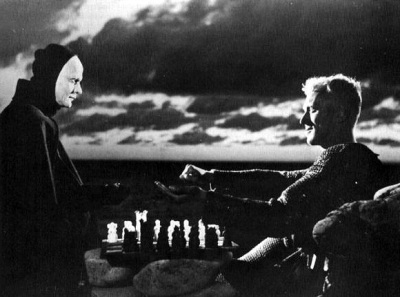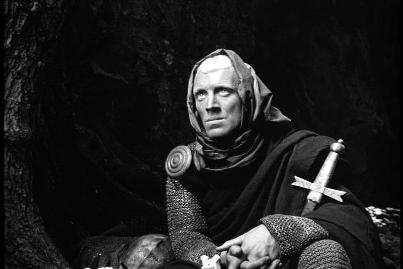A part of this viewing list: Criterion Collection Spine #11: Ingmar Bergman’s The Seventh Seal.
And when he had opened the seventh seal, there was silence in heaven about the space of half an hour.
Rev. 8:1

There is little I can say about The Seventh Seal that has not been said before. I will say that I love the sound of Swedish and the way that I can almost understand it at times. I will say that I love the crystal cinematography and the way the lighting is nearly its own character, so strong is its presence on the screen. And I will talk a little about the motifs that I noticed this second time that I’ve watched the film.
Silence is the most noticeable theme, established quite early with the opening quotation from the book of Revelation and then reinforced when the appearance of Death mutes the sound of breakers rolling onto the shore of Sweden. It continues, but is not present through the entire film. Bergman insists, at first at least, that silence says more than speech if you listen correctly. Witness J?ns account of his interaction with the corpse of a plague victim:
KNIGHT
Well, did he show you the way?J?NS
Not exactly.KNIGHT
What did he say?J?NS
Nothing.KNIGHT
Was he a mute?J?NS
No, sir, I wouldn’t say that. As a matter of fact, he was quite eloquent.
The knight Antonius Block’s disregard for this silence or his squire’s smartass comments shows another sort of deafness, to speak mixaphorically, the inability to hear what is under one’s nose. J?ns is the truth-speaker in the film, almost a Dostoevksian holy fool, except for the thick skin of cynicism that he has gained as a veteran of ten years of crusading. He has no illusions regarding the absurdity of his existence and thinks of religion as nothing more than entertaining folklore.
But Block refuses to give in to look into Nieztsche’s abyss. He seeks one significant act to make him feel as though his life has been worth something. And even J?ns, for all his talk, doubts his own doubt. As this turmoil builds within each character, the silence becomes less obvious and sound takes a larger role. A storm is building.
Enter Death! Even when Bengt Ekerot isn’t onscreen, the presence and threat of death is never far off. The mountebanks have a skull mask that is always hanging nearby, and shots are often framed so that the mask is looking over the shoulder of the characters. In Block’s most pastoral scene, the dinner of wild strawberries and milk at dusk, the mask of Death is at its liveliest, the eyes seem alive as a sheet blows behind them.
A similar progression as the one from silence to sound also takes place in terms of Death. Early in the film Death is to be respected but feared, and the scenes where he is present are filled with a vivacity that eventually becomes Death’s province by the end of the film. The lighthearted scenes seem shallow in the aftermath of the plague-swept countryside and the fear that drives men to burn a girl for fornication with the Devil. What Death offers becomes more and more appealing, almost joyous to the perils of living.
Yet Block still seeks the one meritorius act that will allow him to die at peace, even if his questions remain unanswered. He succeeds, in a transcendental moment [featuring my favorite shot, below] while playing chess with Death. He knows he has lost, but stalls long enough for the mountebank family to escape. He has cheated Death on others’ behalf, at the cost of his own life. Yet in some way, death is a reward involving the submission of his own will to that of the inevitable.
In the final sequence, as Death makes them dance along the hillside, it is interesting to see who is not in his train, J?ns girl and Block’s wife Karin are not included. I don’t know why, but I suspect it has something to do with the fact that they were the most welcoming of Death when he appeared.
This film is so ripe for examination that I could go on for much longer, talking about it as an allegory for the Cold War, as an existentialist morality play, as a film about dealing with religious doubt and tons more. But I’ve written enough for today.

2 And I saw the seven angels which stood before God; and to them were given seven trumpets.
3 And another angel came and stood at the altar, having a golden censer; and there was given unto him much incense, that he should offer it with the prayers of all saints upon the golden altar which was before the throne.
4 And the smoke of the incense, which came with the prayers of the saints, ascended up before God out of the angel’s hand.
5 And the angel took the censer, and filled it with fire of the altar, and cast it into the earth: and there were voices, and thunderings, and lightnings, and an earthquake.
Rev. 8:2–5
• Criterion Essay by Peter Cowie.
• Tons of good quality stills here.
• An undated draft of the script at IMSDb. The Criterion subtitling is superior, in my opinion.
• Analysis of The Seventh Seal from Film & the Critical Eye by Dennis DeNitto and William Herman.
• YouTube film student reenactment of a scene from the film. [I had to do one of these from a Steven Soderbergh film]
• The Criterion Contraption’s review.